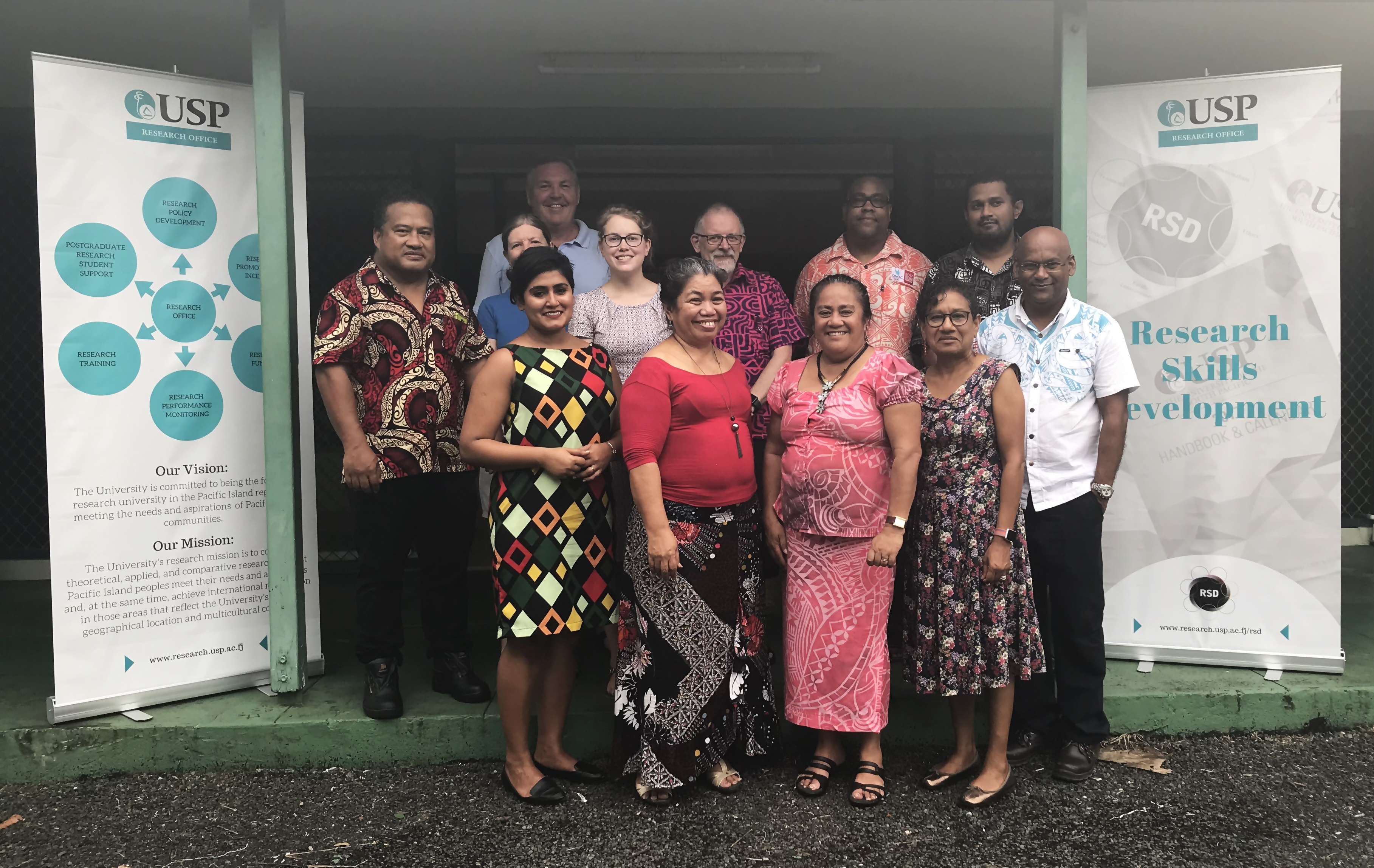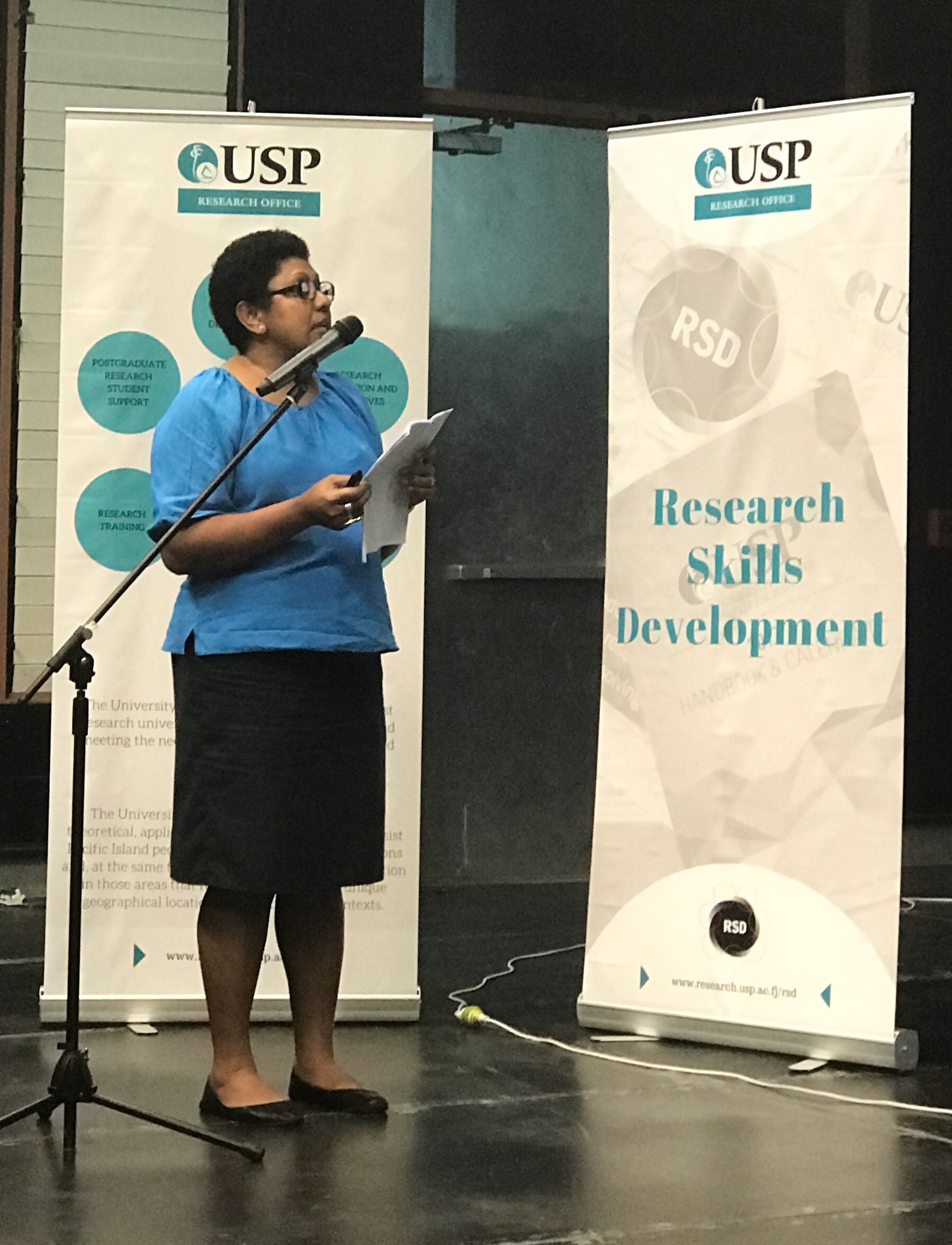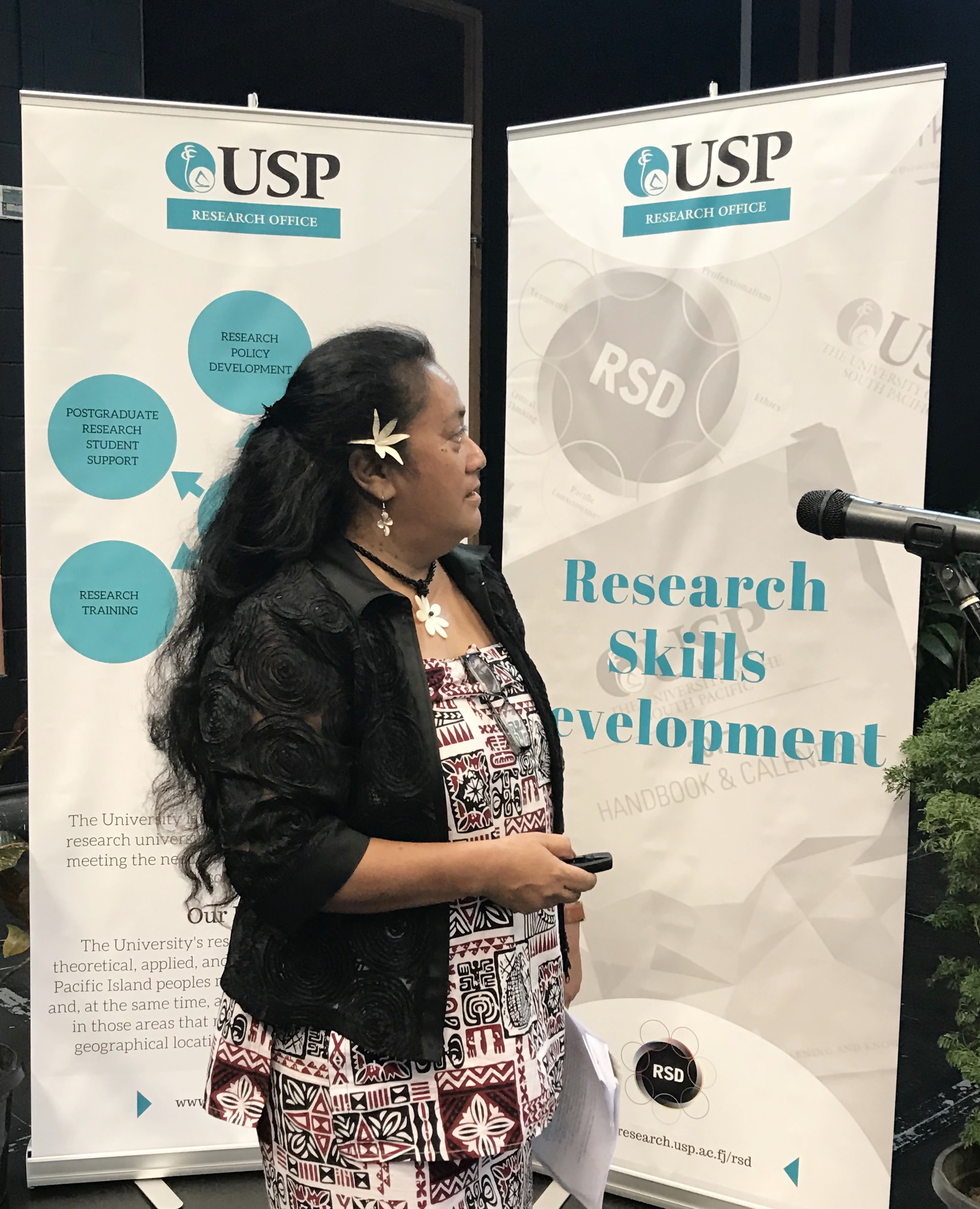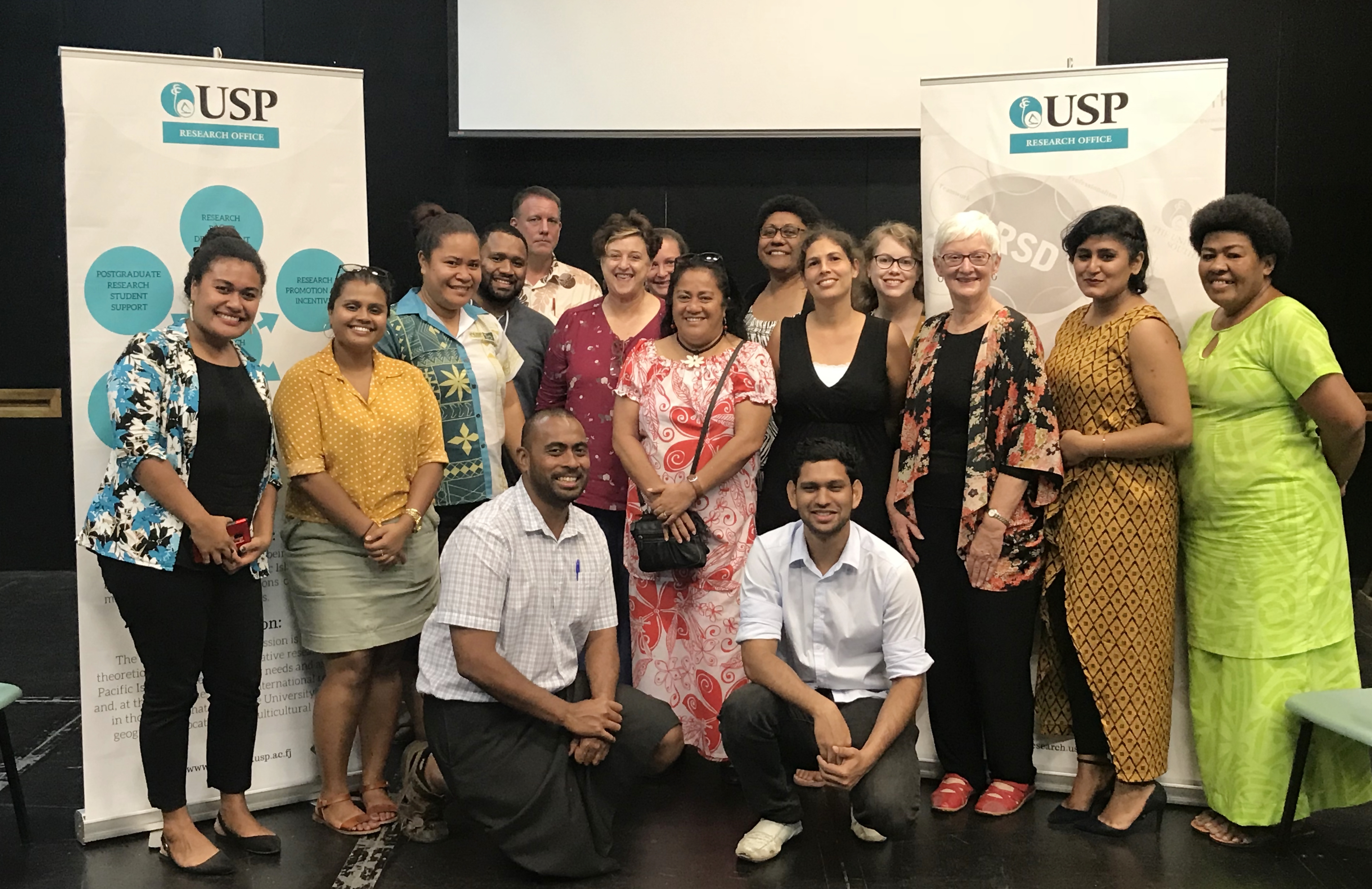
The Research Office at The University of the South Pacific held its first Research Skill Development Community of Practice [RSD CoP] gathering on the 23rd of February, 2018. The ‘RSD Community of Practice’ was established in September 2015 for the practitioners of RSD to share their knowledge and skills for developing students’ research literacy and skills in various disciplinary contexts in an informal and relaxed setting. Sharing good practices of teaching, student learning and assessment of research literacy and skills is aimed at helping RSD implementation.
During the gathering the Deputy Vice-Chancellor (Research, Innovation, and International), Professor Armstrong welcomed staff to another year of resourceful collaborations. He iterated that RSD implementation has been a successful project largely due to staff initiative and welcomed Student Learning Specialist and University Library staff onboard the RSD CoP. Professor Armstrong stated that now the RSD CoP will be a community of interprofessional learners (librarians, student learning specialists, and faculty), making it easier to explore how to best help students develop research skills at the University.

The RSD Community of Practice met over lunch on 20th March to discuss student support systems to enhance research skill development at the University. The CoP gathering featured a presentation from Ms Vasiti Chambers of the University Library who spoke of her experience at Monash University while undergoing RSD training, and the changes implemented in her work portfolio since her return. USP Library staff have been conducting Module 1 training which is the “Introduction to the RSD Framework” workshop for support staff and students. Plans are currently underway to run a refresher and introduction to RSD workshop for academic staff in May.
The presentation ensued discussions around support systems in place to enhance student success and the importance of collaborations between the different sections as well as awareness of their areas of expertise. One of the recurring conversations during the CoP gathering was about the provision as well as possible requirement of research skill development for all new students at the University. In response to this discussion, the Library stated that works are currently underway to create content of RSD and Information Research Skills [IRS] for Moodle to ensure self-directed learning for students. Academic staff present appreciated the idea of information available on an online platform and added that the RSD and IRS learning should not be independent of classroom learning while emphasizing the importance of integration of RSD and IRS into classroom curriculum.
Other ideas and issues discussed included the use of more context appropriate terminology as opposed to RSD framework facet terms. The RSD Coordinator agreed, adding that there are two stream of thoughts regarding the framework, one being that it is too rigid to adopt to a particular discipline/culture context and the other that it is a framework which one can easily contextualize. Issues were also raised regarding the inconsistent use of the RSD framework across the University, which most staff felt defeated the purpose of lifelong learning of the research skills.
Presentation: Building a CoP with the RSD Framework

The RSD CoP met for a “Drink and Discuss” session on the 27th of April for their third monthly meet this year. The CoP members met to discuss ideas around a Pacific RSD Framework. The gathering featured a presentation by the Dr Narsamma Lingam, Ms Jiokapeci Qiolevu, and Ms Rosarine Rafai of the UU204 ‘Italitali’ Team. The presentation titled ‘Italitali’ Framework – RSD the Pacific Way was based on a framework the team conceptualized using the existing Research Skill Development [RSD] Framework. The key element of this framework is the use of indigenous terminology related to weaving mats to explain the six facets of the RSD framework to students of the UU204 Pacific Worlds course.
The presentation resulted in avid discussions both for and against such a framework. Many of the CoP members expressed their concurrence in establishing such a framework which would allow educators to acknowledge their students cultural heritage. Concerns were also raised regarding the need to recognize that Pacific cultures are not monolithic hence using iTaukei terminology to teach a class of multicultural students would have its own challenges.
The CoP also briefly discussed ways in which RSD framework could be used for activities outside of the classroom. Particularly for courses which involve working in/with communities in the Pacific. CoP members who had attended the iMELT in Adelaide last December iterated that there are multiple examples of the RSD framework being applied outside of assessments. There are also sister frameworks which are being used by academics and administrators round the world, these are*:
*For more information on the frameworks please visit: https://www.adelaide.edu.au/rsd/melt/
Presentation: ‘Italitali’ Framework – RSD the Pacific Way
The RSD CoP met for a “Drink and Discuss” session on the evening of 25th of May for their monthly meet. CoP 4 was hosted by the Research Skill Development (RSD) Coordinator Ms Janif to address any and all concerns on the use of the RSD framework. The meeting was attended by representatives of all the faculties as well as library and CFL staff. The discussions ranged from RSD use in marking assessments to University graduate outcomes.
One of the keys issues discussed at CoP 4 was achieving RSD compliance for courses. Ms Janif clarified the RSD implementation process, iterating that in order to achieve “RSD Embedded Course” status for any course, the following must be addressed:
The Research Office is also currently in the process of collecting course information and updating the RSD Implementation Status across the University. This is in time for the upcoming external review which is commencing in July this year.
A large part of the discussion at the CoP gathering was also on the hindrance caused to students learning due to poor English language skills. Staff indicated that at times a lack of students proficiency in the English language makes it difficult to focus on the development of literacy/numeracy and research skills with students. Building up from this discussion, the next CoP meeting will feature a presentation from Ms Artila Devi [PhD Candidate – FALE] on how it’s possible to integrate literacy in all courses across the University.

The fifth RSD Community of Practice meeting held on the 20th of July was facilitated by Professor Denise Chalmers and Dr Lee Partridge who were on a site visit conducted the external review for the RSD project at USP. In welcoming the CoP members, Professor Chalmers thanked all those who had taken the time to meet with them and share their ideas and experiences during the project review. Members were further encouraged to share their RSD experiences with their peers and discuss ways in which RSD can be better incorporated into the curricular.
On speaking on how to best incorporate RSD in teaching, Ms Buksh iterated that the RSD framework can be used to assess the University’s graduate outcomes [GOs]; and the way forward would be to see how workshops incorporate the two. Using the rubrics that we use to assess our courses and continue to upgrade it within revised GOs. Staff members would find it useful if we can find or help them develop rubrics that have the RSD elements that would also allow them to assess graduate outcomes. Members present also agreed that the disjuncture between the Graduate Outcomes and RSD framework has caused some confusion with the staff and is a hindrance to RSD implementation.
While talking about the way forward, the CoP identified that the following issues need to be addressed at the institutional level:
In closing the CoP gathering, Dr Partridge expressed that it feels a bit like the RSD is somehow glorified to be some magical silver bullet that is going to solve all problems. RSD is a tool that will help you get to your graduate outcomes and I think it has been made into something bigger than it really is. It is a very convenient tool. So perhaps we need to downplay it a little bit and say this is something to help you get to here but it’s not God.